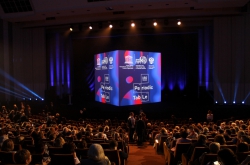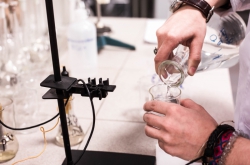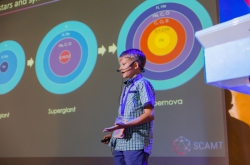IUPAC is an international organization founded in 1919 as the successor of the International Congress of Applied Chemistry. The organization's headquarters are located in Zurich and Chicago. IUPAC is the universally-recognized authority on chemical nomenclature and terminology. As one of its major activities, IUPAC develops recommendations in order to establish unambiguous, uniform, and consistent nomenclature and terminology for specific scientific fields. The recommendations are published in Pure and Applied Chemistry (PAC) Journal.
The International Union of Pure and Applied Chemistry has officially endorsed the 4th International Conference on the Periodic Table which will kick off at ITMO on July 26, 2019.
“This conference is a unique event not only for St. Petersburg, but for the whole Russia: the previous conference was held in Vatican in 1969, while the next one will take place only in 2069. 14 speakers from nine countries have confirmed their participation so far. More information about the speakers can be found on the conference’s website,” comments Mikhail Kurushkin, a lecturer at ITMO Research and Educational Center of Chemical Engineering and Biotechnology, initiator and coordinator of the conference.

In July, Mikhail Kurushkin announced the event at the 22nd annual conference of the International Society for the Philosophy of Chemistry at the University of Bristol. He has also discussed the possibilities of collaboration on the conference’s program and speakers with Oxford University, the University of Bristol, Tsinghua University, and the University of California, Los Angeles.
“It was decided that 17 % of the speakers will be young scientists. If their applications undergo the selection process, they will get an opportunity to present their research side by side with renowned scientists. We think that this is a great chance for young researchers to present their work,” says Mikhail Kurushkin.
Apart from taking part in the 22nd annual conference of the International Society for the Philosophy of Chemistry, Mr. Kurushkin also met with José Antonio Chamizo Guerrero, a representative of the Mexican journal Educacion Quimica, and invited Philip Ball, a science journalist from London (h=30), to take part in the conference.
It’s worth recalling that it was Mikhail Kurushkin who initiated the idea to host the conference in March 2018 when talking to Eric Scerri, a professor of chemistry at the University of California, Los Angeles. The idea was supported by Philip Stewart, professor emeritus of Oxford University, a popularizer of science, the author of the book “Chemical Galaxy”.

According to Prof. Philip Stewart, it’s a milestone that the Conference on the Periodic Table will be held in St. Petersburg, as it is in St. Petersburg where Dmitri Mendeleev formulated the Periodic Law and published his table of chemical elements, which was the predecessor of the modern periodic table.
Among the key topics that will be discussed at the conference are the legacy of Mendeleev and his periodic system, its continuation and limits, alternative versions of the Periodic Table, its educational potential, to name but a few.
“I think that this event will be beneficial for everyone interested in science. Our bodies and our world are made of chemicals, but chemistry remains a closed book for many people. The conference should help to open it up for a wider audience. We have to show people that chemistry is not only useful but also exciting and beautiful,” shares Prof. Philip Stewart.
Among the people who have already joined the event are many Russian and international researchers, including Fabienne Meyers, a member of the IUPAC secretariat and IUPAC Chemistry International journal’s editor. The American Chemical Society has already posted information about the conference on its website. UNESCO has also announced support for the event. The international advisory council of the conference includes scientists from China, Australia, the Netherlands, the US, Mexico, Israel, Malaysia, Ireland, and Russia. IUPAC’s ex-president Natalia Tarasova agreed to become IUPAC’s official representative at the conference. To learn more about the conference and the preparation process, read our article.

2019 will be the 150th anniversary of the periodic table and has therefore been proclaimed the “International Year of the Periodic Table of Chemical Elements” (IYPT 2019). The purpose of IYPT is to enhance the understanding and appreciation of fundamental science among the public. In this regard, scientific conferences, symposiums, competitions, and congresses will be held all around the world. On June 1, IUPAC and UNESCO launched a website dedicated to the International Year of the Periodic Table, where you can find an overview of events in Russia and around the world.




